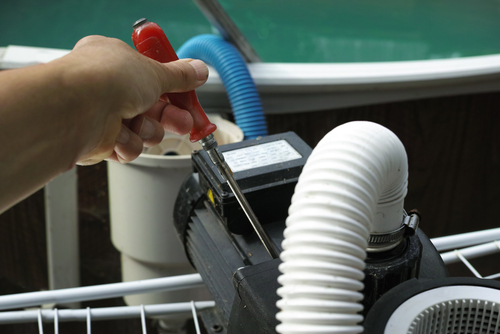
How To Clean And Maintain A Pool Filter?
January 13, 2023
6 Tips for Cleaning Pool Decks and Surrounding Areas
April 10, 2023Can Sanitizing Prevent Algae Growth in Pools?

Can Sanitizing Prevent Algae Growth in Pools? It is common for pool owners to face problems with algae, despite having a functioning filtration system, recommended sanitizer levels, and constant supervision. Algae spores can infiltrate a pool through various means, such as wind, rain, dirt, or even swimmers. It is impossible to completely prevent algae spores from entering a pool, but take measures to prevent them from thriving.
Table of Contents
What Is Pool Algae?

Algae, a living plant organism, is commonly found in swimming pools and can manifest in various colors, including green, teal, yellow, brown, red, and black, thus causing the pool water to appear discolored. A cloudy appearance in the pool water indicates an algae issue.
Algae can float freely or cling to pool walls, cracks, and crevices. Fortunately, with proper swimming pool maintenance, algae can be prevented and treated relatively easily despite its rapid spread. Maintaining clean, algae-free water ensures a happy and healthy environment for your family and pool.
Causes of Green Pool Water

Water in swimming pools can turn green due to copper oxidation from pool equipment, some chemicals used in the collection, or the water itself. Sequestrants, which are metal-removing pool chemicals, can effectively treat this condition.
In addition, pollen can also cause water to turn yellowish-green. Although filtering and skimming can help, pollen is often too small to remove by these methods altogether. Covering the pool when not used is advisable if the pollen counts are high.
However, the most common cause of green pool water is algae. Proper cleaning and maintenance, including appropriate chemicals, pool algae, and green water, can be eliminated. This article will provide practical tips for preventing pool algae.
How To Prevent Pool Algae?

1. Ensure Your Filtration and Circulation System Is Working Properly
Ensuring your pool’s proper circulation system is crucial to preventing pool algae. To maintain adequate circulation, routinely inspecting and cleaning the skimmer and pump strainer baskets is essential. This ensures that the water and sanitizing chemicals are distributed evenly throughout your pool.
In addition to emptying the skimmer and pump strainer baskets, regularly cleaning or backwashing your pool filter is essential. As time passes, filters become clogged with debris and require simple maintenance. It is necessary to clean your cartridge filter or backwash your sand or D.E. filter whenever the pressure gauge reads 8-10 psi higher than usual, regardless of the filter type. For detailed cleaning instructions, you can use your filter’s user manual.
2. Find the Right Brush for Your Pool
It is necessary to brush and scrub the pool walls to prevent algae growth, but caution should be exercised in choosing the appropriate brush, as using the wrong type can cause severe damage to the pool surface.
For those who own a vinyl, pebble, acrylic, fiberglass, painted, or quartz pool, it is recommended to use a nylon brush which is softer and less likely to cause tearing or scratching of the surface. On the other hand, for gunite, plaster, or concrete pools, a wire brush can provide superior cleaning strength.
3. Use a Vacuum to Remove Debris and Dirt
To prevent algae growth in the pool, vacuuming is an effective method in addition to brushing and scrubbing. While brushing the pool walls can dislodge most algae spores clinging to the surface, these spores settle at the bottom of the pool. Using a vacuum or an automatic pool cleaner eliminates much of the dirt, debris, and contaminants that enter the collection.
4. Use an Algaecide Regularly
Regular use of algaecide is an effective way to prevent algae from taking hold in your pool. Several types of algaecides are available, each formulated to combat different types of pool algae. It is optional to wait until algae growth appears in the pool to use an algaecide.
Even when the pool is clean and algae-free, it can be used with the primary sanitizer to prevent algae spores from becoming a more significant issue.
5. Be Vigilant and Monitor Your Pool Throughout the Year.
To own an algae-free pool, four essential steps must be followed:
- Maintaining a cleaning schedule
- Regularly balancing and sanitizing the water
- Circulating/filtering the water
- Being vigilant for any signs of algae growth
A routine maintenance schedule can prevent most algae spores from developing into an algae bloom.
Can Sanitizing Prevent Algae Growth in Pools? – Conclusion

Pools can provide a source of relaxation or family fun, but inadequate maintenance can lead to rapid algae growth. Developing a fundamental strategy for algae prevention will ensure that your pool remains clean and healthy throughout the year.



